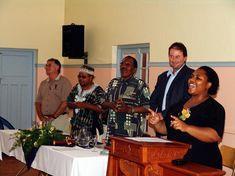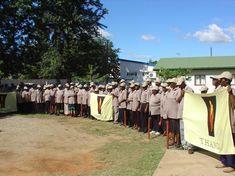

Work has begun on a major building project in South Africa’s eastern Cape as part of the Thandi initiative, which brings Fairtrade fruit to international markets.
The project at Laslappies Farm near Kirkwood has been described as “a model for fair trade” by the Fairtrade Foundation in the UK and involves the building of a centre for worker training and community uses.
As a result of the premiums that the farm - which is run by the Luthando Trust - earns on its oranges, lemons and soft citrus in markets such as the UK, the workers on the farm who are all shareholders in the trust, have been able to start the building.
“It will not only be a training centre for the trust but a multi-purpose centre for the whole community,” explained the Nazeem Sterras, ceo of the Thandi Initiative at the Capespan Foundation. “We hope the centre will be finished by the end of the year when it will be able to offer life-skills training and training in basic skills such as literacy, as well as computer literacy for the wider community. It will also offer HIV awareness and more advanced training such as entrepreneurship and business management.”
The development has been welcomed by the Fairtrade Foundation in the UK. “It is a really good example of the way Fairtrade is working,” said a spokeswoman. “It is a good model of Fairtrade and one that will have substantial benefit to the community.”
South African farms are unique in the world-wide fair-trade movement because of their link with the South African government’s black empowerment drive.
The Thandi initiative is part of Capespan’s support for the government programme encouraging joint-ownership and capacity building in South Africa’s fruit export sector.
The number of projects already running will soon be more than doubled to 11. According to Sterras, volumes from the six projects already accredited to Thandi will grow to 1.3 million cartons by the end of this year, up from just 7,000 cartons at the outset of the initiative in 2002.
The Luthando Trust was only certified to supply Fairtrade products under the Thandi brand at the start of the citrus season in May last year and is growing rapidly. The Thandi model requires workers to hold at least a 25 per cent share at launch, but Luthando’s workers already own 75 per cent of the shares less than a year on. Full ownership is due by 2009.
Thandi’s exports sold under the Fairtrade label earn a 15 per cent premium over conventional produce.
Meanwhile as the UK celebrates Fairtrade Fortnight until March 13, the foundation estimates that its 433 producer groups in 49 countries will earn $50m more in 2005 than if they had sold their products on the conventional market.



